Economy Minister: Croatia Wants Stability and Progress of Bosnia and Herzegovina
ZAGREB, 11 May 2022 - Croatian Economy and Sustainable Development Minister Davor Filipović said in Sarajevo on Wednesday that Bosnia and Herzegovina had been and remained an important neighbour and partner to Croatia and that it was necessary to strengthen cooperation and support the stability of that country.
Filipović was attending the 11th Sarajevo Business Forum and in his welcome speech he underscored that Croatian Prime Minister Andrej Plenković's government was taking the challenges of economic recovery and progress seriously and was committed to them despite the problems caused by the coronavirus pandemic and now the Russian aggression against Ukraine.
He said that the economic progress and recovery of the entire Western Balkans were important to Croatia, as the area is its immediate neighbourhood, which should and must have a clear perspective of membership of the European Union.
Therefore, he said, Croatia will always be ready to offer its knowledge and experience necessary for the implementation of reforms important for European integration, and this is especially true for Bosnia and Herzegovina, where Croats are one of the three constituent peoples.
Croatia is strongly committed to the stability and security of Bosnia and Herzegovina and its progress towards Euro-Atlantic integration, said Filipović, adding that there were numerous opportunities for economic cooperation between the two countries.
For more, check out our politics section.
Croatian Foreign Minister Attends Global Coalition Against Daesh Meeting
ZAGREB, 11 May 2022 - Croatian Foreign Minister Gordan Grlić Radman attended a Global Coalition against Daesh ministerial meeting in Marrakech on Wednesday, the ministry said in a press release.
The meeting was led by Moroccan Minister of Foreign Affairs, African Cooperation and Moroccan Expatriates Nasser Bourita and U.S. Secretary of State Antony Blinken.
The coalition's first ministerial meeting in Africa was aimed at reaffirming the partners' commitment to fighting Daesh via military as well as growing civilian action so as to permanently defeat the terrorist organisation.
The coalition strongly condemned the recent attacks in Afghanistan during Ramadan by Daesh's local Khorasan branch, supporting all victims and their families and reiterating the determination to bring all Daesh members to justice.
The coalition said the priority was civilian protection and respect for international law, including humanitarian law and human rights, as well as for all relevant Security Council resolutions. It also underlined the role of women and youth in preventing radicalisation and implementing de-radicalisation.
The coalition's main job remains to defeat Daesh in Iraq and Syria as well as to stabilise liberated territories and remove the causes that contributed to Daesh's rise in Syria.
The coalition welcomed the establishment of the Africa Focus Group as well as the coalition's enlargement in Africa.
Grlić Radman reaffirmed Croatia's commitment to the coalition's efforts and goals. In his address, he underlined the importance of the cooperation between the EU and Africa's states, including anti-terrorist cooperation.
He recalled the deaths of Croatian company Hidroelektra's workers in Algeria in 1993 and the execution of a Croatian national in Egypt in 2015. He voiced deep understanding for all victims of terrorism, saying that supporting tolerance, intercultural and interreligious dialogue is one of the best defences against terrorist propaganda and attempts to spread hate and fear.
For more, check out our politics section.
Financial System's Exposure to Systemic Risks Increased, Says Central Bank
ZAGREB, 11 May 2022 - The Croatian National Bank (HNB) Council on Wednesday said the domestic financial system's exposure to systemic risks has increased due to the war in Ukraine and sanctions against Russia, and that inflation will increase the cost of new loans and burden loan repayments with variable interest.
The HNB Council discussed current economic and financial trends, underscoring that statistical indicators show that economic growth strengthened at the start of the year but that weaker consumer confidence is evident which, despite a mild recovery, retained a relatively low level in April.
Increased employment stopped in March, even though nominal wages are growing increasingly fast, while inflation has accelerated as the increased prices of oil and raw food on global markets, partially affected by the war in Ukraine, are spilling over onto domestic prices of petroleum products and food, HNB said.
Due to expected changes in the monetary policies of central banks in major economic areas, short-term and long-term costs of state financing have increased, with interest rates on corporate loans increasing slightly too, the HNB Council said. In those circumstances, lending to non-financial companies has accelerated, while household loans continue to increase at stable rates, reflecting strong housing loans.
The financial system's overall exposure to systemic risks has increased due to the war in Ukraine and sanctions against Russia, with the consequences prices of raw materials and other goods on global and regional markets. The uncertainties with regard to the pandemic and recent geopolitical tensions have not yet jeopardised the stability of Croatia's finance sector, HNB said.
The challenges in the coming period are related to geopolitical instabilities and inflationary pressures, the effects of expected normalisation of the monetary policy and the continued increase in real estate prices, HNB said.
Gradual price increase on new loans and burden on repayment of loans with a variable interest rate
The duration of the war in Ukraine will determine the degree of impact on macroeconomic, fiscal and financial trends.
HNB notes that disruptions in supply chains which additionally impact price rises could be a great burden on companies and households. In circumstances of growing inflation, it is expected that monetary policies will sharpen and key interest rates will increase in the largest economic areas. That will gradually increase the cost of new loans and burden loan repayments with a variable interest rate, HNB noted.
The negative impact of increased interest rates is buffered by a tendency of a decreased debt by households and companies and a relatively low level of debt by households and a relatively small number of loans whose repayments could increase significantly. The introduction of the euro as the official tender will additionally impact price increases and the government's debt.
Harsher financing conditions on international financial markets and then an increase in domestic interest rates could buffer some risks for financial stability that strengthened over the long period of low interest rates, such as the strong borrowing by the private sector, low bank profitability and search for risky investment alternatives that offer a higher return rate. That risk is also related to a strong price increases in real estate, which is supported by a large volume of housing loans, HNB said.
HNB underscored that it is monitoring and analysing the development of the financial system's vulnerability so that it can introduce measures in its remit. It recalled that at the start of 2022 it had announced raising the rate of anti-cyclic protected capital which would additionally strengthen the resilience of credit institutions from possible losses related to exposure to cyclic systemic risks in a downward phase of a financial cycle or the emergence of an unexpected crisis.
For more, make sure to check out our dedicated business section.
State Must Make Abortion Available, Centre-left Opposition Says
ZAGREB, 11 May 2022 - Seven centre-left opposition parliamentary groups on Wednesday supported the Social Democratic Party's medical pregnancy termination bill, saying it is a woman's right to decide whether to terminate a pregnancy and that the state must make that service available.
"A woman has the right to reproductive health, quality and available healthcare, information and self-determination, and public healthcare must provide her with everything the law guarantees", Sabina Glasovac of the SDP said, presenting the bill.
"It is a woman's right to plan a family, choose if, when and with whom to start a family or give birth as well as whether she will terminate a pregnancy", she added.
The state must ensure legal, safe and quality medical pregnancy termination per request, and a woman should be provided with all the necessary, accurate and scientifically-based information, according to the bill.
It says that all authorised public hospitals must ensure, without delay, questioning or obstruction, pregnancy termination at a woman's request until the end of the 12th week of gestation, and in specific legal situations after that.
The costs of pregnancy termination should be covered by the state and hospitals must ensure a sufficient number of doctors who do not refuse to perform the procedure, or be fined up to HRK 500,000.
Ivana Posavec Krivec of the Social Democrats called on the government and the ruling majority to endorse the bill and prevent the further erosion of women's rights.
The 1978 abortion law which is in force is the minimum civilisational achievement which should be amended due to developments in science, medicine and WHO guidelines, she added.
Urša Raukar Gamulin of the Green-Left Bloc said it was necessary to respect the law, the Constitution and the Constitutional Court, which decided in 2017 that a new abortion law must be passed in two years' time.
"We will fight for abortion in Croatia to be safe, legal, available, free and painless. We acknowledge conscientious objection, but every hospital's management has the duty to ensure abortion regardless of conscientious objection", she added.
"We don't advocate abortion but a woman's right to decide about her body and respect the law", said Krešo Beljak of the Croatian Peasant Party, adding that doctors who invoke conscientious objection are hypocrites because they don't invoke it in private hospitals.
"We live in a secular state and will fight with every political means for Croatia not to fall into the hands of ultra-conservatives, quasi-believers and liars who, for personal gain, are trying to return Croatia to the Middle Ages", said Beljak.
Anka Mrak Taritaš of GLAS said this was a civilisational, not a world-view issue because deciding on abortion is the exclusive right of a woman and her family.
Dalija Orešković of the Centre party said it was unacceptable that any authorities would refuse to execute a Constitutional Court decision. It's a negation of the state and the rule of law, it's the (ruling) HDZ's violence against institutions, she added.
We know the HDZ won't support this bill, so our primary battle is not to allow the HDZ to negate the rights that exist in the law. No woman in Croatia must ever again feel humiliated and shamed when deciding on her legal rights, which don't exist in practice because Croatia is run by parallel interest groups, including the Church, said Orešković.
Katarina Nemet of the Istrian Democratic Party said they would support the bill as acquired human and civil rights, notably women's right to choose, should be viewed as a civilisational minimum.
Gas Professionals say Croatia in Better Position Than Most of EU
ZAGREB, 11 May 2022 - Croatian energy regulator HERA Steering Board chair Danijel Žamboki said at a conference of gas professionals on Wednesday that even in the worst-case scenario regarding gas supply, Croatia would be in a much better position that most EU countries.
"That is so because of the diversification of supply routes, the LNG terminal and domestic gas production, which has been growing," Žamboki said at the 37th international conference of gas professionals, taking place in Opatija on 11-13 May and organised by the Croatian Gas Centre and the Croatian Gas Association.
Recalling that the government in March adopted a set of measures to alleviate the impact of rising energy prices, Žamboki said that the basic task of the regulator was to care for energy producers and protect consumers and that it would continue working on that.
The state secretary at the Economy and Sustainable Development Ministry, Ivo Milatić, said that Croatia was among leading countries in terms of the protection of households amid rising gas prices.
Speaking of the LNG terminal on the island of Krk, he said that it gave Croatia a rare kind of security, "with 800 million cubic metres of gas to enter the gas system from production in the coming year and 1.5 billion cubic metres from the LNG terminal."
The ministry will support a further increase in the terminal's capacity to 6.1 billion cubic metres, he said, noting that that could be achieved in three years' time or sooner.
The director of the Okoli underground gas storage facility, Vlado Vlašić, recalled that the storage capacity had been leased for the next five years and that there was currently no interest on the part of the clients to fill the facility, but that he believed the facility would retain its role and ensure supply stability, thanks to the government's involvement.
Vlašić said that work was underway to expand the storage capacity, which would enable the company to provide additional services in the gas business.
LNG Hrvatska director Hrvoje Krhen said that so far 2.4 billion cubic metres of natural gas had been delivered so far via the LNG terminal at Omišalj on Krk, that 28 LNG tankers had docked at the floating terminal and that around 4 million cubic metres of liquefied natural gas had been delivered.
The LNG terminal supplies gas for around 55% of the market and the gasification capacity has been expanded by an additional 300 million cubic metres of natural gas. The capacity has been fully leased until 2027, and the possibility of further expanding it is being considered, Krhen said.
Plinacro gas transport system operator Management Board member Marin Zovko announced plans for expanding the capacity for shipping gas from the terminal, increasing the capacity of the gas pipelines running to Hungary and Slovenia, and considering a project for an Adriatic gas pipeline grid and connecting to neighbouring countries, such as Bosnia and Herzegovina.
Nikola Mišetić of INA said that own gas production met around 30% of gas needs in Croatia. This year INA will invest more than one billion kuna in research and production, he said, adding that the company was also dedicated to green projects.
Before the opening of the conference, several members of the Green Action protested inside the venue where the event was taking place, carrying banners reading "Gas business is crime" and calling for turning to renewables and energy efficiency as well as reducing the need for gas as much as possible.
For more, check out our politics section.
Croatia and Cyprus Can Assist in Europe's Energy Independence
ZAGREB, 11 May 2022 - Cyprus can help the European Union achieve energy independence, President Nicos Anastasiades said on Wednesday during an official visit by Croatian Prime Minister Andrej Plenković, who underscored that the LNG terminal on Krk Island would have a big role in that.
The two officials discussed the energy crisis in the wake of Russia's invasion of Ukraine.
President Anastasiades also condemned a decision by Turkey to not join in Europe's sanctions against Russia.
Anastasiades spoke about energy inter-connection projects in the eastern Mediterranean, between north Africa and Europe, and about the EastMed gas pipeline which should connect Cyprus with Europe via Greece.
That island state has in recent years discovered significant offshore gas deposits, and the proposed project is still being analysed to test its economic feasibility, said Anastasiades.
It can help Europe's energy diversification, he told a news conference.
Addressing the news conference in Nicosia, Plenković underlined that the LNG terminal on Krk Island would have a significant role in achieving Europe's energy security. Thought is being given currently to increasing its capacity and not just for Croatia but for the needs of countries in Central Europe, he said.
Croatia can become an energy hub in the north Adriatic for gas and oil, said Plenković.
He underscored that Europe has to find a new, long-term sustainable alternative to Russia's energy products at an affordable price.
Bilateral cooperation
The two officials emphasised that this was the first visit by a Croatian prime minister to Cyprus and that it should mark a turning point in cooperation between the two countries so that their political agreement on European topics can expand to economic ones.
The two countries are expected to finalise in November an agreement on avoiding double taxation and they have also signed a memorandum on strengthening economic cooperation, which should be accompanied by a memorandum on digital transformation and sea traffic.
We are two Mediterranean countries not far from each other, we share the Mediterranean and I believe there is a lot of room for expanding cooperation, Plenković said, underlining the petrochemical and electrical energy industries, IT sector, pharmaceutical industry and financial and digital cooperation.
Cyprus and Croatia have been connected by air for the past two years, which has resulted in an increased number of tourists.
Croatia's political objectives
Plenković said that he and "his good friend" Anastasiades also discussed Croatia's ambitions for deeper integration in the EU that should occur this year - accession to the passport-free Schengen area, on which a final formal decision is expected in June or July, and accession to the euro area, on which a decision is expected in July.
We will be ready for euro changeover on 1 January, said Plenković.
The two officials also discussed the situation in Southeast Europe, with emphasis on Bosnia and Herzegovina and the need to ensure the political rights of Croats in that country, with Zagreb having full support from Nicosia in that regard.
Plenković's two-day visit to Cyprus, during which he laid a wreath at the monument to Makarios III, Archbishop of Cyprus who was the country's first president and is considered to be the father of the nation, ended with a meeting with the country's parliament speaker.
For more, check out our politics section.
5+ Years Living in Split: Expat Eric del Castillo from Mexico City
May 11, 2022 - In our new TCN series, we uncover the lives of expats that have spent over 5 years living in Split. Next up, meet Eric del Castillo from Mexico City!
Two idyllic weeks on a Croatian beach is very different from the realities of full-time living. So what is it really like to live in Croatia as an expat? In a new series on TCN, we meet expats who have lived here for 5 years or more, to find out from them the good, the bad, and the ugly of 12-month living in Croatia. Next up, Eric del Castillo from Mexico City!
1. Tell us firstly how you came to Croatia? What motivated you to choose this slice of paradise and how long have you now been here?
It's a long story, but starts in Sausalito, California. In 1996, I was at an artistic residency at The Headlands Center for the Arts. There I met Neli Ružić an artist from Split and I fell in love with her at the first moment. A year later I visited Split for the first time when Luka was born, the following year Neli and Luka visited Mexico, and a year later I returned to Split for them and we went to live in Mexico. Pablo was born in Mexico City and we lived there for 13 years. At a hearing in the summer of 2010, we decided to move and live in Split, after two years of preparations we finally arrived in Split in 2012. Now we have almost 10 years living here.
2. Looking back, what were your perceptions and expectations?
From 1997 to 2010, I saw a great change in the infrastructure and the economy of the country and good quality of life. However, in Mexico, the so-called war against drugs began and violence and insecurity grew up. Our expectation was to offer our children a much safer and healthier environment. Every day I confirm that we were not wrong and that we made the right decision.
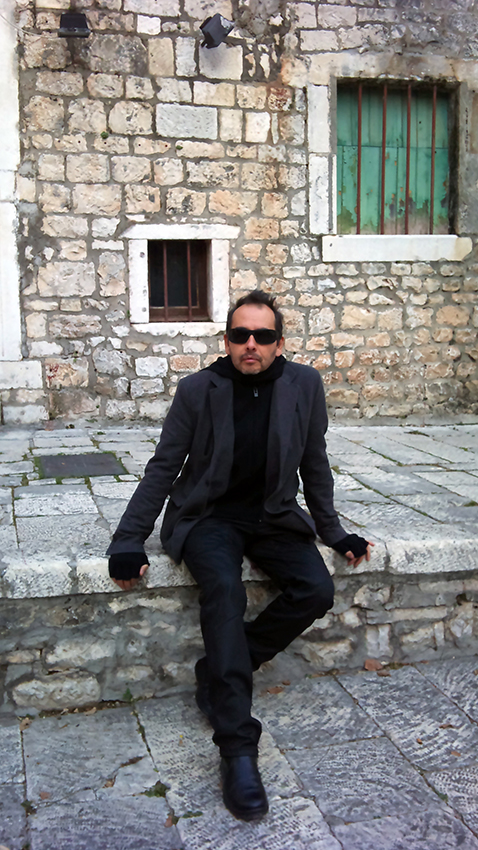
And of course, language is an issue, but malo po malo. I'm doing better and already I got my permanent residency.
3. After 10 years here, how have those perceptions changed. Do you now view Croatia differently?
There is no perfect place, as everywhere there is bureaucracy, corruption, lack of budget, legal gaps, poverty, and inequality. But I think that these are things that are much easier to solve in a country of 4 million than in others of 130 million.
4. After your time year, the 3 things you love most about Croatia?
The art scene and the artistic community, it's a very supportive group and I've made great friends, they are amazing people.
The food and the good quality and freshness of local products, and of course the extraordinary good weather.

5. And the 3 things you would like to change.
A more open society
Simplicity in government office services, meaning less bureaucracy and more digital services.
To have in the old town center a digital fiber-optic network.
A better system and more awareness on separation and recycling of waste disposals.
6. Given your experiences, what advice would you give to any would-be expat thinking of making the move?
Split is a fascinating city, with great history. Very safe and easy to access and move around, everything is relatively close. For me, it is a source of inspiration and in every corner, I always find extraordinary details, with so many layers of history one above another, it is like a visual palimpsest.
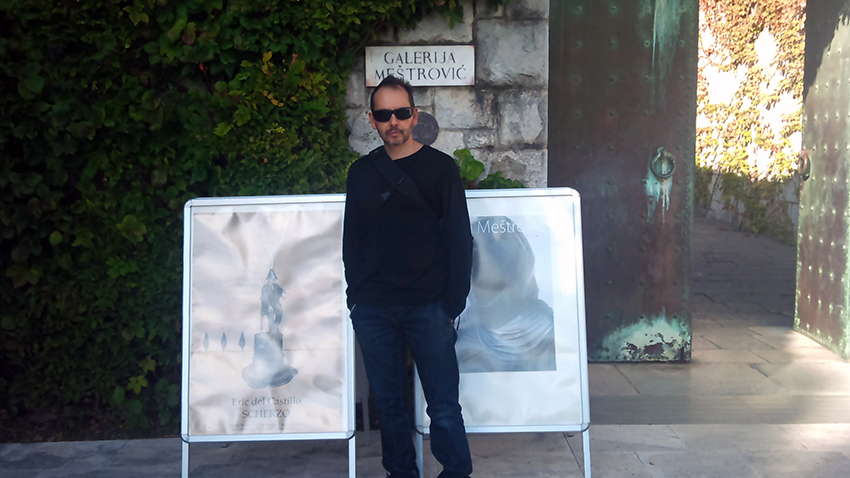
7. The most beautiful place in Croatia, and why?
I couldn't mention just one there are lots of them: I love the cities of Split and Zagreb, the landscapes, the sea, and the islands. Nature is incredibly beautiful in Croatia.
8. Your favourite moment of your time in Croatia?
There are many moments that I have really treasured. Christmas is one of the few dates that we can all be together. When I have exhibitions, I had several exhibitions in split and Zagreb.
When we receive family and friends from Mexico, the house is always open to receive visitors.
Summer In Šolta, we are there a big part of summer and we spend all the time in nature.
I always have lots of work to do there, taking care of the garden and plants, trying to plant and develop my avocado trees, for now, I haven't succeeded, improving year by year the technique of suho zid, and of course, always creating some artwork.
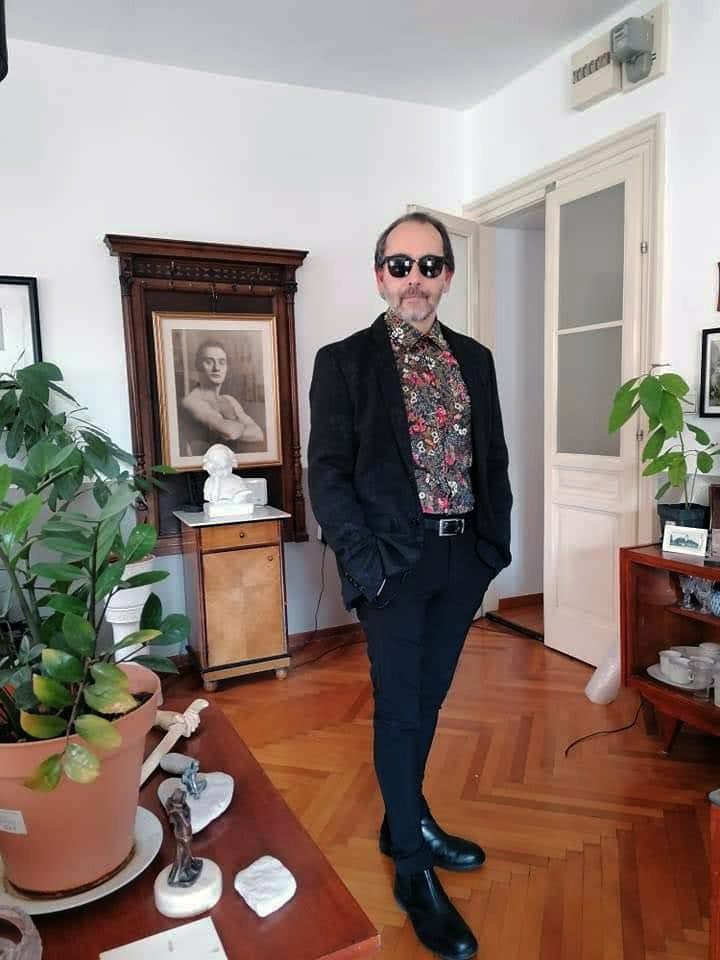
Learn more about Eric here:
facebook@ericdelcastilloarchive>
Are you an expat who would like to be featured in this series? If yes, please contact This email address is being protected from spambots. You need JavaScript enabled to view it. Subject Expat
For more, make sure to check out our dedicated lifestyle section.
Best Beaches in Slavonia - Freshwater Paradise
May 12, 2022 - Summer is on the horizon, temperatures are higher and people are already planning how to cool down in the coming hot months. Unfortunately, not everyone can afford or reach the Adriatic coastline for much-deserved relaxation. However, Croatia has countless beautiful rivers and lakes used for swimming and recreation and Slavonia is full of those. A look into the best beaches in Slavonia.
As mentioned before, some people living outside of regions located near the Adriatic coast can’t afford or travel great distances for the ultimate Croatian summer. Because of those limitations, people needed to find ways to cool themselves and relax in their cities during unbearably hot months. Slavonia is definitely one of those regions. Older Slavonians will remember those summers decades ago when only a few families could afford to go to the Adriatic coast, after saving money all year, and others “less fortunate ones”, would go to rivers and lakes near their hometown. Those swimming places were made up on the go - “beaches” were mostly covered with untouched nature and unexplored terrains. Let’s just say they weren’t particularly safe but after a few accidents and realizations that structured swim places can be profitable and safe havens for families with kids, local authorities started investing in swimming and recreational infrastructure on those lakes and rivers. Water quality began to be reviewed for swimmers and after tests showed that the quality is excellent, the building could start. Without further ado, these are the best beaches in Slavonia.
“Copacabana” on Drava River in Osijek - “Kopika”
The list of best beaches in Slavonia starts with non-other than “Kopika”. One of the most popular river beaches in Slavonia, this is one of the swimming places in Slavonia that you can’t miss. Beach that offers views of iconic places in Osijek like Tvrđa, co-cathedral of St Peter and St Paul, Hotel Osijek, and the Bridge of Youth? Amazing. Since 2020, the beach and recreation center went through a lot of renovations and “Kopika” will shine in its new guise this summer. Modern pools, showers, cabins, and many more, make this beach unmissable this summer.
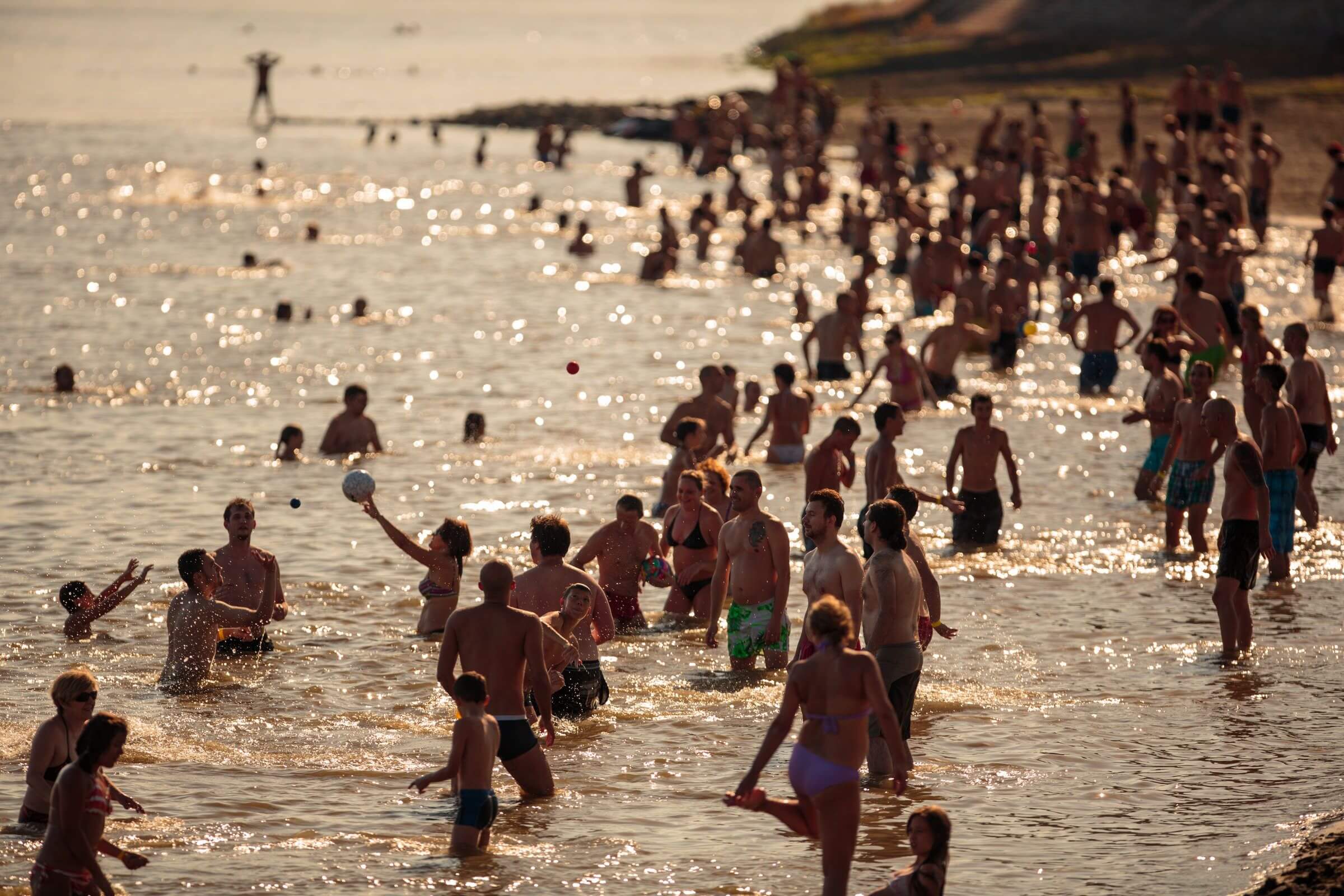
"Kopika" beach in Osijek (image credits: Mario Romulić)
Križnica Island on Drava River
This island is located on the Drava River near the small town of Pitomača, the westernmost municipality in Virovitica - Podravina County. Once the border between the Kingdoms of Croatia and Slavonia, this ancient island was the last one in the historic Pannonian Sea and its sandy beach attracts swimmers and recreationalists all over the country. Its bike routes, local cuisine, and natural private retreat make this river beach one of the best in the country and it’s an unmissable place to visit for refreshments and relaxation.
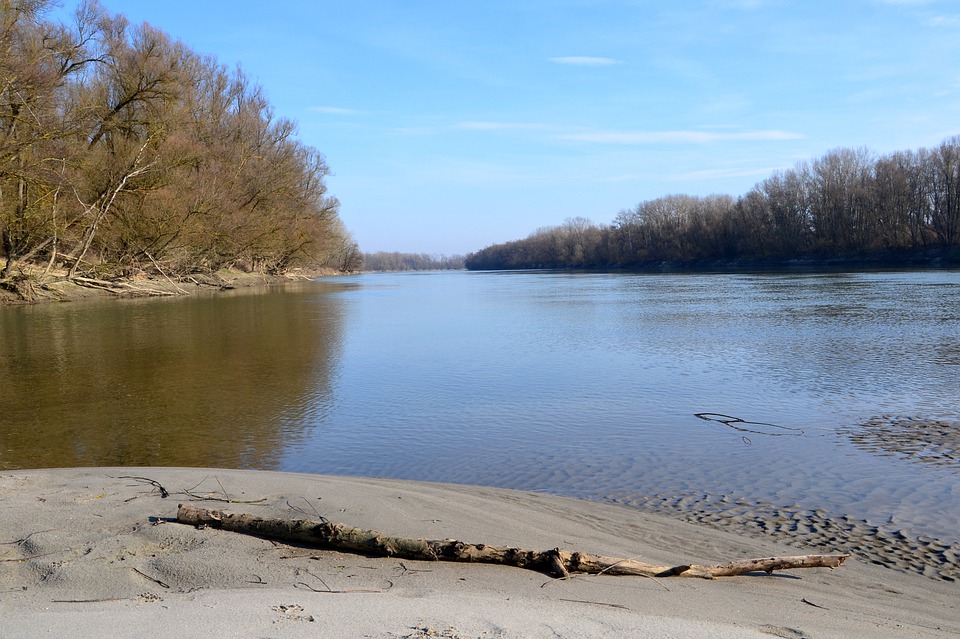
Križnica Island on Drava River (image credits: glaspodravine.hr)
Poloj Sports and Recreation Center
Apart from the Drava, the Sava River and its Poloj beach takes the crown as one of the most beautiful beaches in Europe. During summer, this beach attracts plenty of swimmers in need of refreshments. The white sand beach that can compete with some on the Adriatic coast, offers a lot of content - sandy fields for volleyball, futsal, places for barbecue, bike and pedestrian routes, and many more. Slavonski Brod and its surroundings is an amazing place for Digital Nomads and other tourists because it offers everything for everyone. So, visit this amazing place during summer, you won’t regret it.
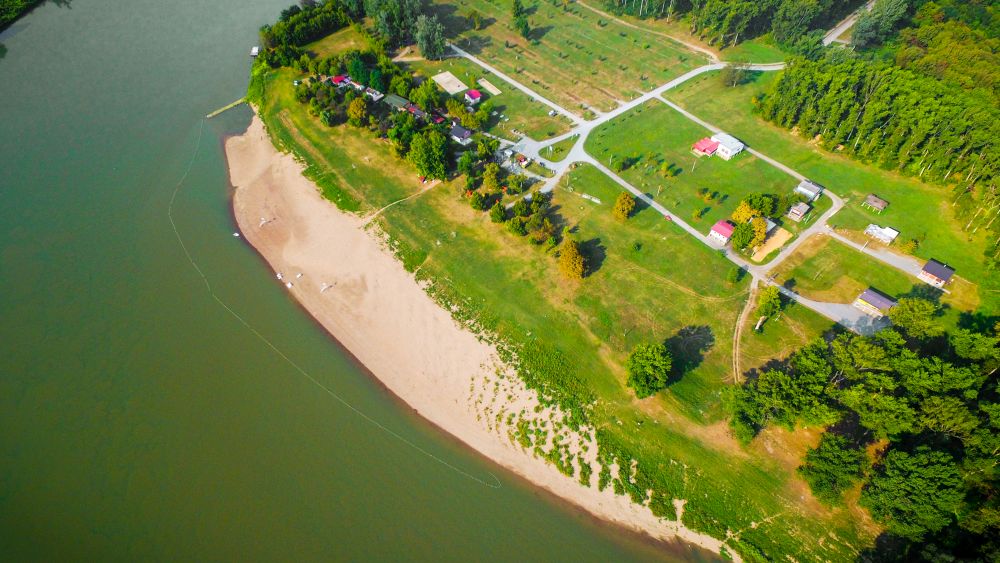
Beach Poloj on Sava River, Slavonski Brod (image credits: Alen Vrlazić/tzbpz.hr)
Lakes Banja in Vinkovci
Once upon a time, these two artificial lakes had different usage. More precisely, it was used for clay excavations for a brick factory back in the day and only brave men would go and swim there. However, in 1997, the realization of the potential these lakes have for sport, recreation and relaxation hit, and since then, Lakes Banja became a popular swimming place for residents of Vinkovci. The amazing quality of water and clean and tidy beaches are a perfect place for fishermen and people who want to have a proper swim. After that, barbecue, beer, and an amazing time.
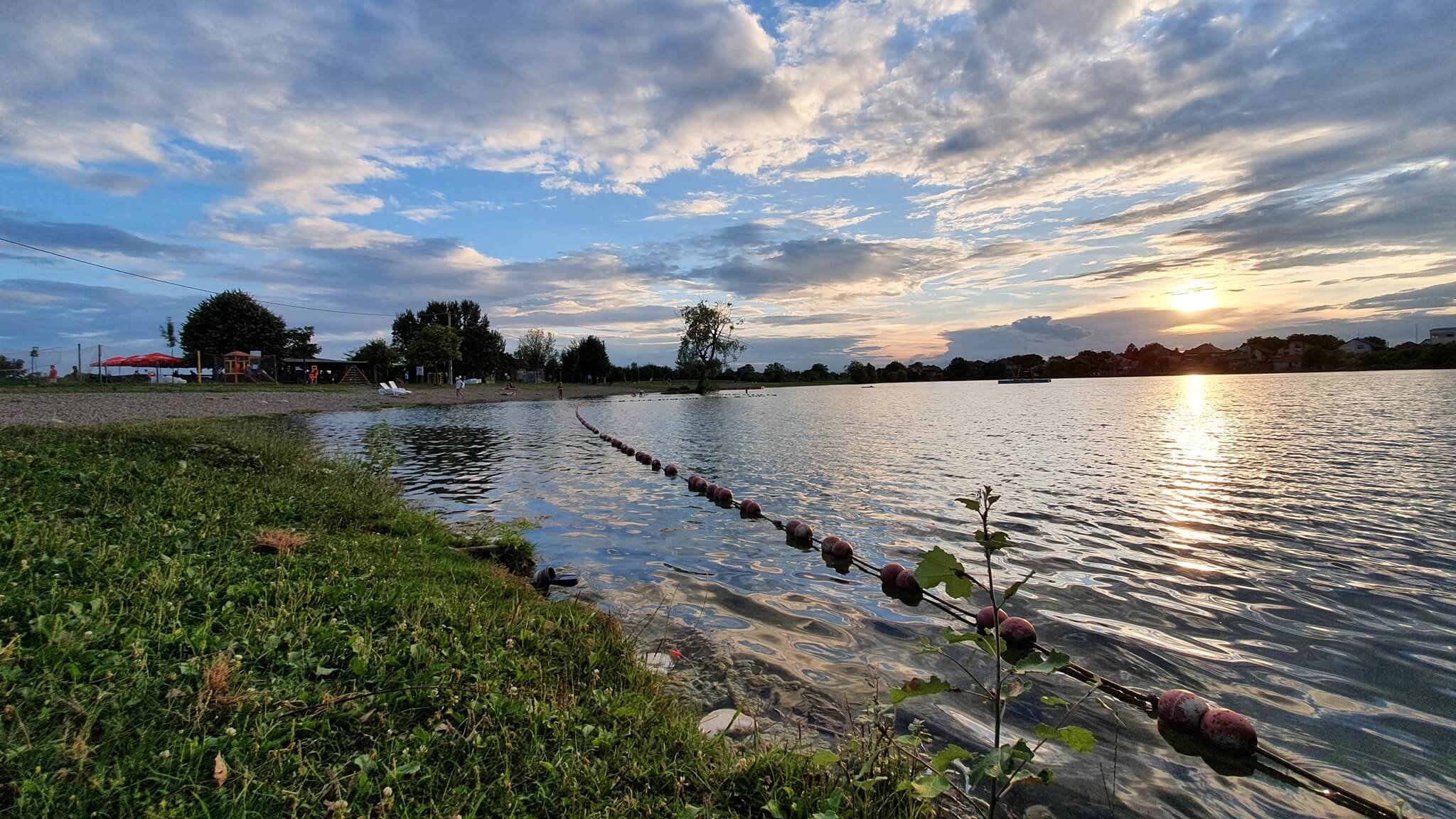
Lakes Banja in Vinkovci (image credits: Banja Vinkovci/Facebook)
Ada Island on the Danube River in Vukovar
Ada is a beautiful Croatian river island on the Danube River covered in a sandy beach and it’s a favorite swimming place in the city of Vukovar. Only 10 minutes away from cities center by boat and ranked among the ten most beautiful and interesting beaches in Croatia located along rivers and lakes. All those interested in peaceful vacations or maybe active vacations and adventures will surely find something for themselves. Amazing tourist offer that includes boat tours, volleyball on sand, and a gazebo full of refreshing drinks under the shade of the forest, makes this one of the best beaches in Slavonia.
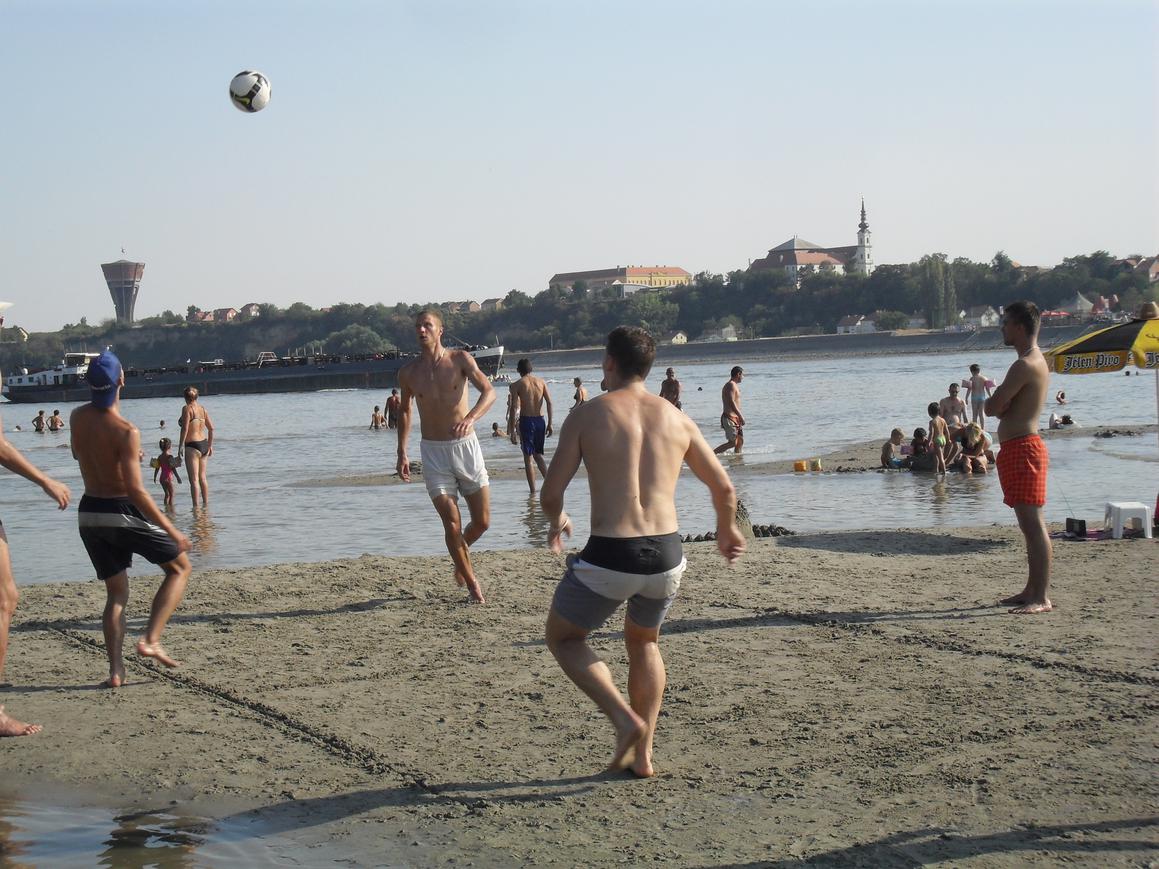
Residents of Vukovar playing beach volleyball on Ada Island (image credits: Branimir Bradarić/lokalni.hr)
Lake Orahovica near village Duzluka
Only 1500 meters away from the historic town of Orahovica, this artificial lake is probably the only proper place to swim in its radius. Last year, this famous lake celebrated its 60th birthday and it’s not stopping soon. This lake is a magnet for fun. From the most popular music festival in Slavonia Ferragosto Jam to the rich recreation offer, Lake Orahovica is an unavoidable place to visit and what’s also really important to mention, its water comes from the mountains! Besides its clear natural water, location is idyllic - just at the foot of Papuk Mountain and the historic fortified city Ružica City that, according to one legend, was a gathering place of fairies. It’s truly looking like a fairytale from Ivana Brlić-Mažuranić novels indeed.
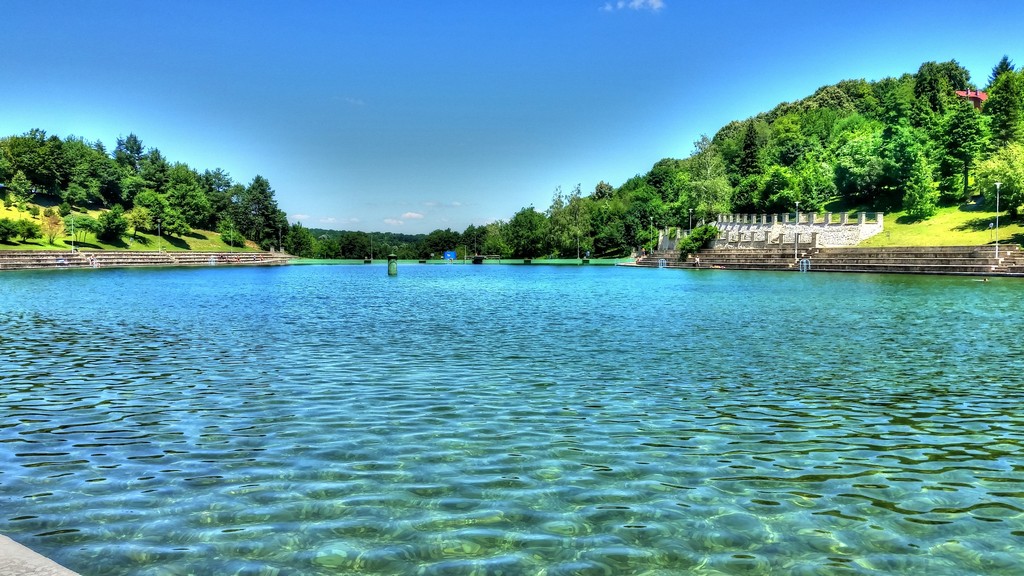
Lake Orahovica is surrounded by historic sightings and mountains (image credits: orahovica.hr)
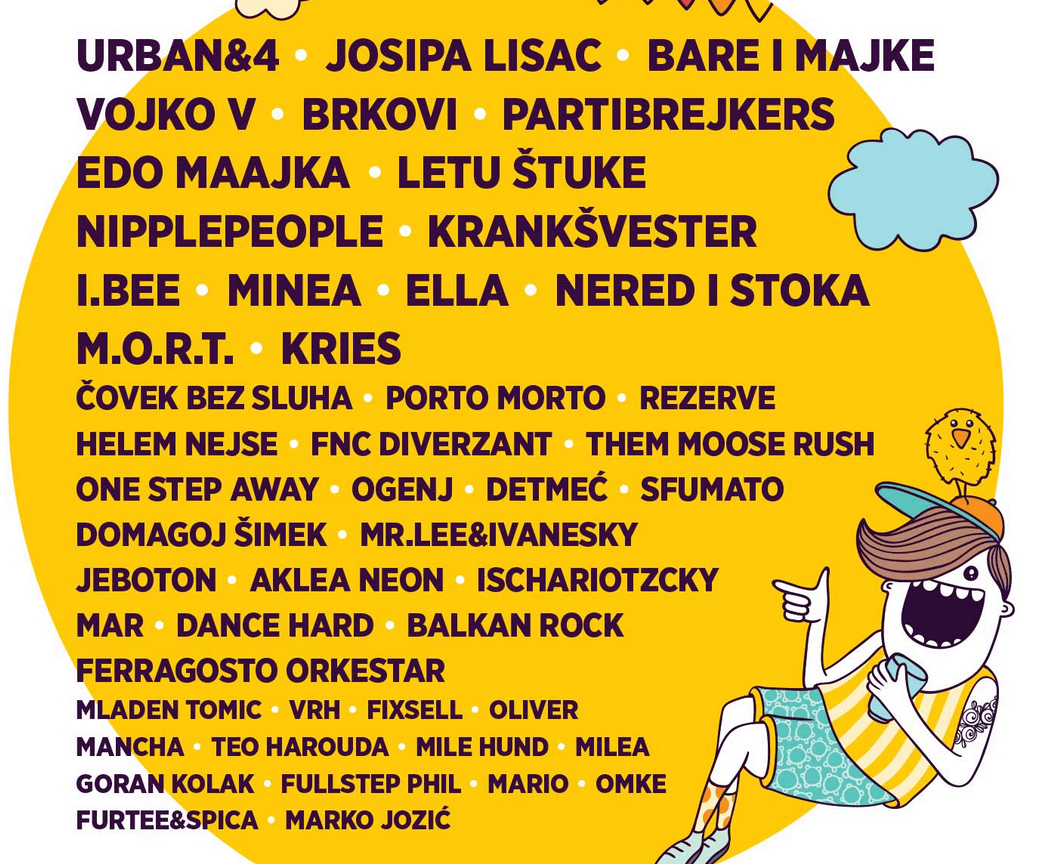
Ferragosto Jam brings the best of Croatian music every year to Lake Orahovica (image credits: screenshot/ferragostojam.com)
Honorable mentions are recently officially opened for swimmers Bajer Lake in Đakovo, Lake Borovik located west of Đakovo, natural Lake Đola in Darda near Osijek, beaches in Batina and Aljmaš where Drava River flows into Danube River, Lake Petnja, northwest of Slavonski Brod and so many more.
All of these places are rooted in Slavonians' lives. Great tourist offers and safe place for families, makes river and lake beach a must-visit during this summer. Yes, summers in Slavonia can be more insufferable than in, for example, Dalmatia (different climate), but for that, these freshwater beaches make every hot summer durable. Furthermore, it makes it the most anticipated season in Slavonia. Hopefully, this list of best beaches in Slavonia will encourage tourists to come - Slavonians will welcome you with open arms.
For more, check out our travel section.
Holy See State Secretary arrives in Zagreb
ZAGREB, 11 May 2022 - The Vatican's State Secretary, Cardinal Pietro Parolin, arrived in Zagreb on Tuesday for a three-day visit during which he will meet with the highest Croatian religious and political leaders, the Zagreb Archdiocese said in a statement.
Parolin is visiting Croatia on the occasion of the 30th anniversary of its recognition and the 25th anniversary of the ratification of three agreements between the Holy See and Croatia.
The Vatican dignitary was welcomed at Zagreb Airport by a delegation headed by Zagreb Archbishop Josip Bozanić.
On Wednesday, Parolin will meet with members of the Croatian Bishops Conference, and later on the same day he will lead a religious service in Zagreb.
On Thursday, Cardinal Parolin is expected to meet with Prime Minister Andrej Plenković and Parliament Speaker Gordan Jandroković and address the parliament, after which he will meet with President Zoran Milanović, the Zagreb Archdiocese said.
For more, make sure to check out our dedicated lifestyle section.
Croatian Medical Law Association Comments on Čavajda Case
ZAGREB, 11 May 2022 - In a comment on the case of Mirela Čavajda, the Croatian Medical Law Association says that the institution of conscientious objection is being maligned and imposed as the only obstacle to solving the problem, underlining the need for responsible conduct by all stakeholders.
Čavajda is a 39-year-old who has requested a pregnancy termination because the fetus has been diagnosed with massive brain cancer six months into her pregnancy. She recently told the Index web portal that all hospitals in Zagreb she contacted had refused to do a termination of pregnancy despite the fact that doctors told her that the tumour was so big the child most likely would not live long, and even if it did, it would never have a normal life.
Her complaint against the hospitals' decision is to be discussed by a second-instance commission at the KBC Zagreb Hospital, whose expert commission, formed last week at the request of Health Minister Vili Beroš, was of the view that the child has a chance to live and that neurosurgical treatment is possible if the delivery goes well.
The Croatian Medical Law Association says that the right to conscientious objection applies also to doctors, as determined by the Council of Europe Parliamentary Assembly Resolution 1763 of 2010, which says that no legal or physical person shall be coerced, held liable or discriminated against in any manner because of a refusal to perform, accommodate, assist or submit to an abortion, the performance of a human miscarriage, or euthanasia or any act which could cause the death of a human foetus or embryo, for any reason.
The association says the importance of conscientious objection as a criterion for assessing the quality of a legal system is evidenced by International Conscientious Objection Day, observed on 15 May.
It considers as problematic attempts to devalue the institution of conscientious objection through social dilemmas surrounding abortion and similar topics that cause polarisation and calls for a joint approach by different scientific disciplines and professions as well as interest groups, in discussing it.
"Any public political, social or other moralising without clear medical and legal arguments is not acceptable and can only cause deep value, moral and ethical divisions in the already fairly polarised Croatian society", the association's president, Miran Cvitković, says.


